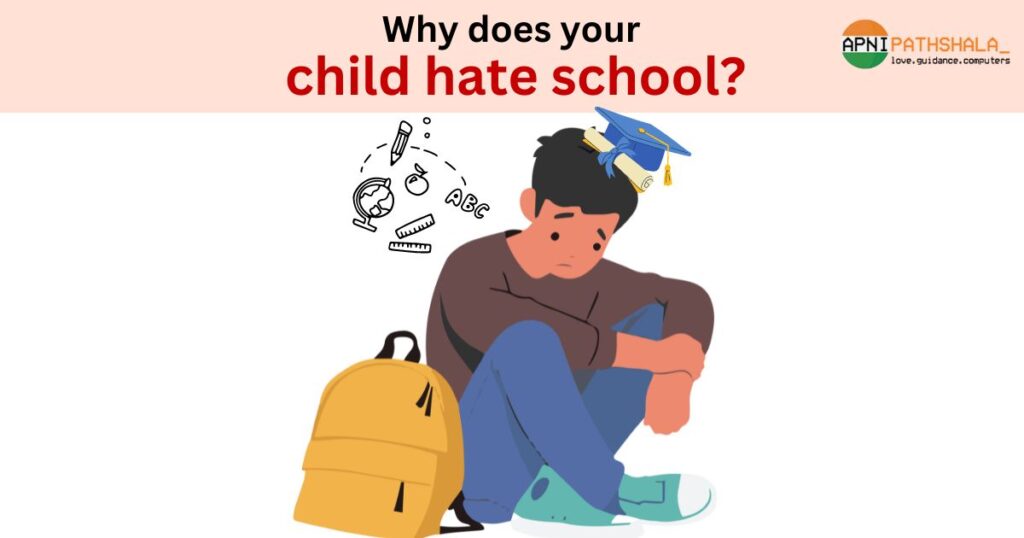Why does your Child hate school?

“Education is the most powerful weapon which you can use to change the world.” – Nelson Mandela According to a recent study, nearly 50% of students report feeling stressed or anxious about school every single day. That’s half of our kids entering schools with a sense of fear rather than excitement. “Why does my child hate school?” is one of the questions that is common among several teachers, parents and community leaders. The question that they face when they see their child hating to go to school. Now, don’t get me wrong—schools play a crucial role in our society but have you ever actually wondered and asked yourself the reason behind this? You’re not alone. Knowing the main causes behind this hatred is important for understanding this problem. Education is changing, and the traditional model of schooling is not the only option for parents and teachers anymore. Through this blog, we aim to explain to you the issues that scare your kids when they think about going to school. Understanding the Core Problem: Why School Might be a Nightmare? Students feel confused when they are expected to understand a wide range of subjects in a limited time due to an overloaded curriculum. Imagine a child having to learn 8 subjects and those 8 subjects having 8 more chapters to learn from. A feeling of frustration and hate towards school emerges due to this pressure. It is no surprise kids will start hating the learning process too. For instance, imagine a student who is passionate about studying but is overburdened by the vast syllabus that he has to study to pass his exams. Not only will the student feel stressed about the whole situation but his passion to study will not only fade away but he will develop a feeling of fear and hatred towards schools. Instead of being encouraged to explore their interests and talents, he is boxed into a narrow path that might not align with their natural abilities. Another reason why kids lose interest in school is because it can be boring. Many schools still use old teaching methods like long lectures and reading from textbooks. Imagine sitting through that without any fun activities. It’s no wonder kids feel disconnected from what they’re learning. On the other hand, social media, YouTube, and other online content are super interesting and exciting. They grab kids’ attention easily with videos, games, and interactive content. For example, if a student is being taught the concept of atoms in chemistry through a long lecture without any visual reference, he will not find it relevant as he cannot find the uses of atoms in his life or what atoms even are. On the contrary, if he is taught through visual animations or presentations about atoms and molecules, he will learn and understand the concepts much faster and more easily. The true meaning of teaching a child lies in helping the child to learn more, ask more questions and try to solve problems. However, modern teaching methods fail to do this as they prefer rote learning and repetitive tasks. This makes the quality of education poor. Asking questions outside the syllabus is punished and students are trained to speak answers like a machine. Students find it hard to connect with teaching when it fails to truly make them understand. Similarly, a teacher of a large classroom cannot give individual attention to 50 students at once, help them all fix their mistakes as well teach them equally at the same time. They also have to catch up with the large syllabus. This leads to some students being left behind on the syllabus or stuck on mistakes with the teacher unable to help them. When students find the learning material boring, their motivation to study becomes zero. Students fail to find the connection between what they are learning and what they want to do in their future careers. This disconnection can make school seem pointless, leading to frustration and disinterest. Similarly, when students lack relevant knowledge or background in a subject, it becomes challenging for them to grasp new concepts. For instance, if a group of students in a math class hasn’t fully understood the basics of algebra, they will struggle to follow when the teacher introduces more complex topics like quadratic equations. This gap in understanding can cause confusion and frustration, as these students are unable to connect the new material with what they should have learned earlier. Consequently, they fall further behind their peers, and the teacher may not have the time to revisit basic concepts due to the pressure of covering the entire syllabus. How Can You Help Your Child? Being a parent we understand this, but how do we help our child? Can we in any way help them love the learning process? Yes, let’s see how: Bringing interactive and hands-on activities in schools can make learning more interesting. Project-based learning, experiments, and real-world applications help students see the value of what they are learning. Motivating students to tell their concerns and feelings can help to lower stress. Open communication between students, parents, and teachers allows for support and help. Training teachers to identify learning difficulties ensures that students receive the help they need. Development in this area can improve teaching and support for all students. Programs that teach stress management techniques, such as relaxation exercises, mindfulness and meditation can help students deal with stress and pressure. Fusing a balanced approach to academics and extracurricular activities is beneficial. Providing resources such as counselling services, academic support, and parenting workshops helps families identify issues related to school. Providing guidance and assistance makes sure that students and parents have the tools they need to understand each other Understanding why your child hates school is the first step toward making their experience from one of hate to one of joy. It’s important to identify that these feelings are often caused due to reasons outside of academics. Remember, the goal is not to force your child
